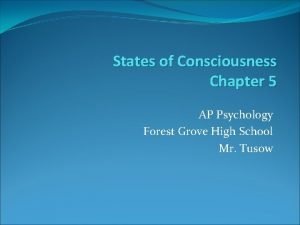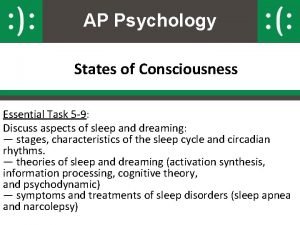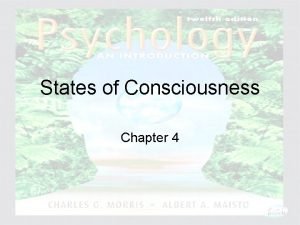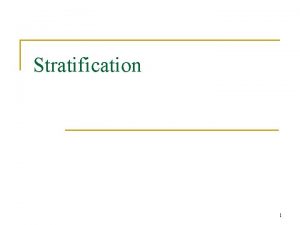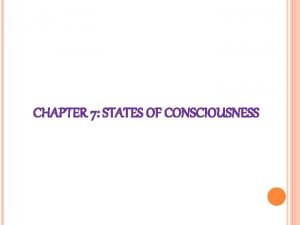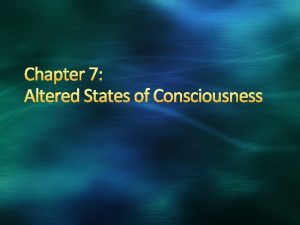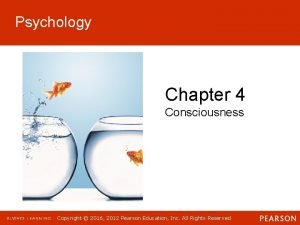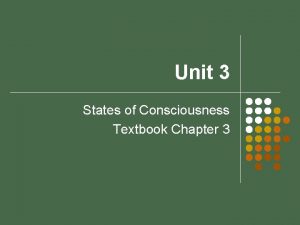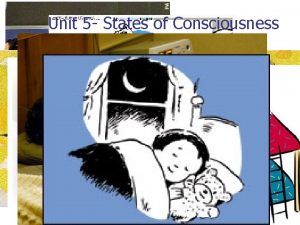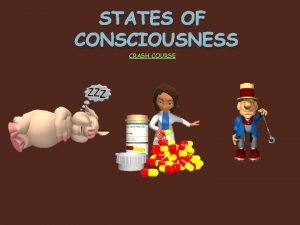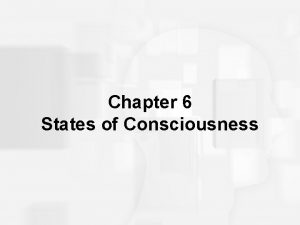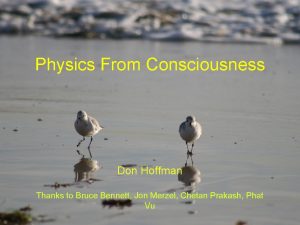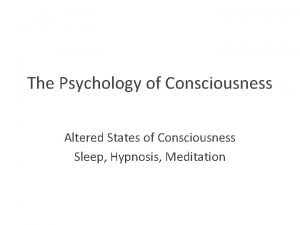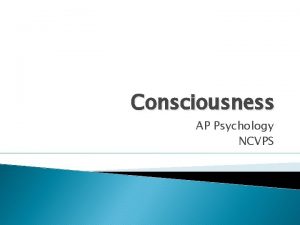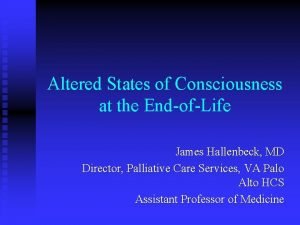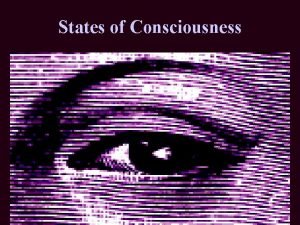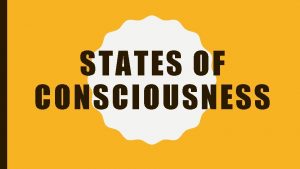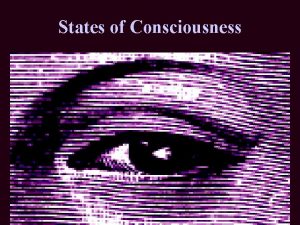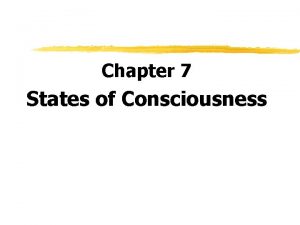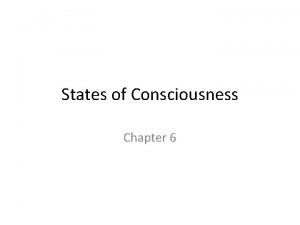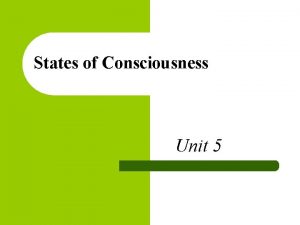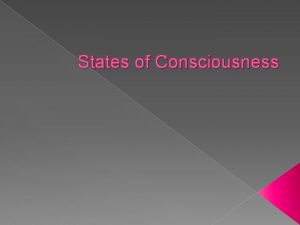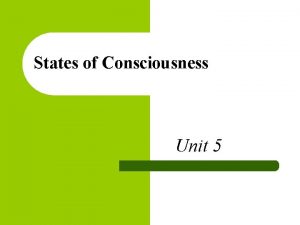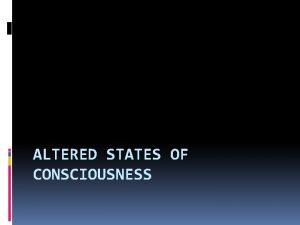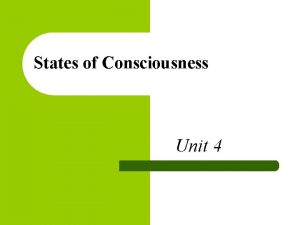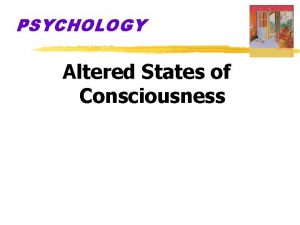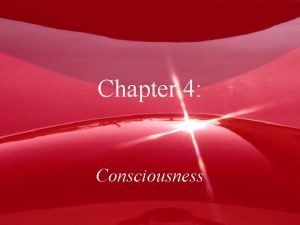Chapter 7 States of Consciousness Psychology and Consciousness

















- Slides: 17

Chapter 7 States of Consciousness

Psychology and Consciousness z. In the beginning, psychology was the description and explanation of states of consciousness y. Too hard to observe z. Later, psychology changed to study of behavior z. Advances in science brought consciousness back into psychology z. We can look at brain activity in various states z. Can be altered by hypnosis and dreams

Consciousness § our awareness of ourselves and our environments § Variations in consciousness enable us to plan and reflect § Awareness

Conscious Awareness and the Unconscious z. Enables us to exert voluntary control and to communicate our mental states to others z. Tip of information processing z. We process a great deal of information beyond our awareness z. Unconscious information processing occurs at the same time

Lag Time z. Consciousness is known to lag behind the brain events that evoke it y. We experience a musical chord after all the notes are present z. Consciousness arrives late to the decisionmaking party! z. If you move your wrist you will be aware of it. 2 seconds before you do it, BUT your brain is. 35 seconds ahead of your conscious perception of the decision

Conscious Processing z. Conscious processing takes place in a sequence z. Relatively slow z. Limited capacity z. Skilled at solving novel problems z. Running on auto pilot allows consciousness to monitor the whole system and deal with new issues z. New/novel tasks require conscious attention

Testing! z. Move the foot of your dominant hand in a counter-clockwise circle in front of you z. At the same time write the number 3 over and over z. Can you do it? z. Probably not. Both tasks require conscious attention, which can only be one place at a time z. Natural protection to keep us from doing too much

Hypnosis z. A social interaction in which one person suggest to another that certain perceptions, feelings, thoughts, and behaviors will occur z. Make people do, say, believe things that they would not otherwise z. Has been around forever z. Is it an altered state of consciousness?

Fact or Fiction? z. Power is not in the hypnosis but the subject’s openness to suggestion z. No magical mind control z. Everyone is suggestible, to some degree y. Everyone stand up y. Stanford Hypnotic Susceptibility Scale Test z. Some are highly hypnotizable, others are not z. Anyone who can turn attention inward and imagine is hypnotizable – that is what hypnosis is

Fact or Fiction Continued z Can hypnosis be used to remember forgotten events? y. Suppressed memories? y. Most people believe that our experiences are all “in there” x. NOT true (chapter 9!) y. Research says no! y. Tend to combine fact with fiction y. Hypnotist can plant ideas, i. e. do you hear loud noises y. Courts are banning testimony hypnotic testimony

Fact v Fiction Continued z. Can hypnosis force people to act against their will? y. Perform dangerous acts? y. Authoritative person has the power y. Can “make” people do things they would not otherwise do – hypnotized or not y. Studies have been done that show hypnotized and non-hypnotized will do the same things

Fact v Fiction Continued (yes again) z. Can hypnosis be therapeutic? y. Used as a treatment for many disorders y. Goal is to have patients harness their own healing powers y. Posthypnotic suggestions have been know to “result” in some amazing things – but it is power of suggestion and how that works on an individual

Fact v Fiction…yep, more! z. Can hypnosis help alleviate pain? y. Yes! How? y. Dissociation: split in consciousness, which allows some thoughts to occur at the same time as others x. Sensation of pain separate from emotional perception of pain y. Selective attention: Focused on one things, so we don’t notice the pain x. Athlete does notice pain of injury until after game Bottom line – it is not that pain does not happen – it is that we don’t pay attention to stimuli

So…About that Altered State z. Knowing that pain stimuli can be not recognized, does that mean that hypnosis is an altered mental state? z. Attention guides perceptions z. People don’t fake hypnosis they just get caught up in it – just like an actor can get caught up in a role z. Social influence theory contends that it is a social behavior and that hypnotic subjects are caught up in the role playing

Divided Consciousness? z. The other theory is divided consciousness z. There are behaviors that are unique to hypnosis y. Distinctive brain activity y. Hilgard y. Vivid form over every day mind splits (doing one thing our of routine while thinking about something else – thinking while reading a book) y. We do process information without conscious awareness

Explaining Hypnosis

End Day 1 z. Homework: y. Research at home. Use these notes. Use your book. Answer the following question: x. Explain apparent hypnotic states. Are they a social phenomena or divided consciousness? Defend/explain your conclusion. (2 paragraphs)
 Latent dreams definition
Latent dreams definition Sleep theories ap psychology
Sleep theories ap psychology Ap psychology states of consciousness
Ap psychology states of consciousness Ap psychology states of consciousness
Ap psychology states of consciousness Us social class ladder
Us social class ladder Chapter 7 states of consciousness
Chapter 7 states of consciousness Chapter 7 altered states of consciousness
Chapter 7 altered states of consciousness Chapter 7 altered states of consciousness
Chapter 7 altered states of consciousness Psychology chapter 4 consciousness
Psychology chapter 4 consciousness 3 states of consciousness
3 states of consciousness Unit 5 states of consciousness answers
Unit 5 states of consciousness answers Crash course psychology consciousness
Crash course psychology consciousness Lesson quiz 7-1 altered states of consciousness
Lesson quiz 7-1 altered states of consciousness Unit 5 states of consciousness
Unit 5 states of consciousness Altered state of consciousness psychology
Altered state of consciousness psychology Consciousness definition ap psychology
Consciousness definition ap psychology Altered state of consciousness psychology
Altered state of consciousness psychology Altered state of consciousness psychology
Altered state of consciousness psychology
